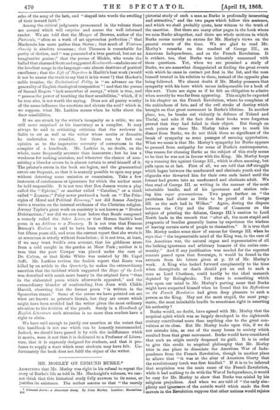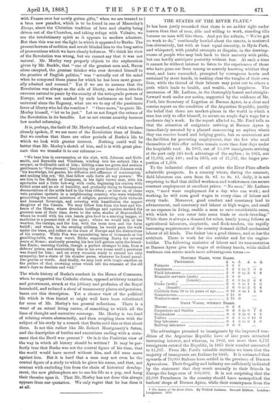MR. MORLEY ON EDMGND BURKE.*
ADMITTING that Mr. Morley was right in his refusal to repeat the story of Burke's life as told in Mr. Macknight's volumes, we can- not think that this historical study fully answers to its name, or justifies its existence. 'The author assures us that " the merely 186 • Edmund Burke: a Historical Beady. By John Morley. London: Macmillan. pictorial study of such a man as Burke is profoundly interesting and attractive," and the two pages which follow this sentence, and which we shall probably quote, bear witness to the truth of the assertion. But there are many other pages in the book where we miss Burke altogether, and there are whole sections in which Burke seems merely an excuse for Mr. Morley's views on the general events of the time. We are glad to read Mr. Morley's remarks on the conduct of George III., on American Independence, and on the French Revolution. It is evident, too, that Burke was intimately concerned with these questions. Yet, when we are promised a study of Burke, we are somewhat disappointed at finding the great events with which he came in contact put first in the list, and the man himself treated in his relation to them, instead of the opposite plan being followed. We almost doubt if Mr. Morley possesses that sympathy with his hero which seems indispensable for a book of this sort. There are signs as if he felt an obligation to admire when secretly he was far from approving. This might be expected in his chapter on the French Revolution, where he complains of the unkindness of fate, and of the evil stroke of destiny which brought on that great movement in Burke's lifetime. In another place, too, he breaks out violently in defence of Toland and Tindal, and asks if the fact that their books were forgotten proved that they had failed in their object. But though on such points as these Mr. Morley takes care to mark his dissent from Burke, we do not think them so significant of the break of sympathy as some passages of seeming approbation. What we mean is that Mr. Morley's sympathy for Burke appears to proceed from antipathy for some of Burke's contemporaries. One reason for choosing Burke as the subject of this study seems to be that he was not in favour with the King. Mr. Morley keeps up a running fire against George III., which is often amusing, but palls upon us at last. First of all, we are told that tht struggle which began between the uneducated and obstinate youth and the oligarchs who thwarted him for their own ends lasted until the former had grown into an uneducated and obstinate adult. We then read of George III. as writing in the manner of the most inimitable beadle, and of his ignorance and station rais- ing him super granzmaticarn. Two pages further on "the patricians had about as little to be proud of in George III. as the mob had in Wilkes." Again, during the dispute between the City and the House of Commons on the subject of printing the debates, George III.'s caution to Lord North leads to the remark that "after all, the most stupid and pragmatic of beadles generally learns by experience the wisdom of leaving certain sorts of people to themselves." It is true that Mr. Morley makes some show of excuse for George III. when he says that " the impenetrable mind of the King was, in the case of the American war, the natural organ and representative of all the lurking ignorance and arbitrary humour of the entire com- munity." And if any justification was needed for the repeated censure passed upon that Sovereign, it would be found in the extracts from his letters given at p. 99 of Mr. Morley's work. A King who looked forward complacently to the time when decrepitude or death should put an end to such a man as Lord Chatham, could hardly be the ideal monarch depicted by Bolingbroke. Yet there is something which jars upon our mind iu Mr. Morley's parting sneer that Burke might have suspected himself when he found that his Reflections on the French Revolution had given deep pleasure to such a person as the King. May not the most stupid, the most prag- matic, the moat inimitable beadle be sometimes right in asserting his authority?
Burke would, no doubt, have agreed with Mr. Morley that the sceptical spirit which was so largely developed in the eighteenth century contributed more than anything else to the great con- vulsion at its close. But Mr. Morley looks upon this, if we do not mistake him, as one of the many boons to society which resulted from that great movement. Burke would have considered that such an origin merely deepened its guilt. It is in order to give this credit to sceptical philosophy that Mr. Morley tries in one place to dissociate the American War of Inde- pendence from the French Revolution, though in another place he allows that "it was at the altar of American liberty that the revolutionary torch was first kindled." If it is to be inferred that scepticism was the main cause of the French Revolution, while it had nothing to do with the War of Independence, it would' be easy for Mr. Morley to show that Burke was misled by his religions prejudices. And when we are told of " the early sim- plicity and ignorance of the outside world which made the first movers in the Revolution suppose that other nations would rejoice
with France over her newly gotten gifts," when we are treated to a bran new paradox, which is to be found in one of Macaulay's Essays, about the Christian tradition of love and charity being driven out of the Churches, and taking refuge with Voltaire, we see the revolutionary spirit as it appears to modern admirers. But then this was not the light in which it appeared to Burke. The present horrors of sedition and revolt blinded him to the long series of provocations which we have clearly before us. We think his view of the Revolution was wrong, but we cannot say that it was not natural. Mr. Morley very properly objects to the explanation given by Mr. Buckle, that " one of the greatest men and, Bacon alone excepted, the greatest thinker who ever devoted himself to the practice of English politics," was " actually out of his mind when he composed those pieces for which he has been most gener- ally admired and revered.". Yet if we are to assume that the Revolution was always on the side of liberty, was driven into the excesses natural to panic by the enmity of the retrograde powers of Europe, and was not marked by such lawlessness as had been universal since the Regency, what are we to say of the passionate lover of liberty who led the reaction ? " Once more," to quote Mr. Morley himself, "let us be just." Let us not forget the crimes of the Revolution in its benefits. Let us not excuse anarchy because law needed reforming.
It is, perhaps, the fault of Mr. Morley's method, of which we have already spoken, if we see more of the Revolution than of Burke. But we confess that there are other periods of Burke's life to which we look with greater interest. Nothing could well be better than Mr. Morley's sketch of him, and it is with great plea- sure that we transfer it to our columns :-
"We hear him in conversation at the club, with Johnson and Gold- smith, and Reynolds and Windham, winding into his subject like a serpent, as Goldsmith said of him; bidding some too grave and anxious gentleman to ' live pleasant;' fascinating the great-hearted Johnson with his knowledge, his genius, his diffusion and affluence of conversation,' and making him cry, 'Sir, that fellow calls forth all my powers.' We see him in the House of Commons, in his tight brown coat, with his spectacles and a little bob-wig with curls, beginning his oration with folded arms and an air of humility, and gradually rising to thunderous denunciations of the noble lord in the blue ribbon ; or later on, of those vain petulant upstarts in a neighbouring country, who were wickedly proscribing the sacred ministers of religion, persecuting their virtuous and innocent Sovereign, and covering with humiliation the august daughter of the Caesars. We may follow him from the heat and vio- lence of the House, where drunken lordlings and squires derided the greatest man of their time, down to the calm shades of Beaconsfield, where he would With his own hands give food to a starving beggar, or medicine to a peasant sick of the ague ; where wo would talk of the weather, the turnips, and the hay, with the team men and the farm bailiff ; and where, in the evening stillness, he would pace the walk under the trees, and reflect on the state of Europe and the distractions of his country. While Fox was squandering tens of thousands at the gambling-table, we may watch Burke supporting Barry for several years at Rome ; anxiously pressing his last half-guinea upon the friend- less Emin; rescuing Crabbe, though a perfect stranger to him, from a debtors' prison, and maintaining him in his own house until a provision was found for him ; and on every occasion ready to extend not only sympathy, but a share of his slender purse, wherever he found penni- less genius or worth. And finally, we may look with tragic, emotion on the pathos of that crowning scene which left the remnant of the old man's days so desolate and void."
The whole history of Burke's conduct in the House of Commons, when he supported the Catholic claims, opposed arbitrary taxation and government, struck at the jobbery and profusion of the Royal household, and reduced a shoal of unnecessary places and pensions, bears out this description. Yet a clearer view of the political life which is thus hinted at might well have been substituted for some of Mr. Morley's too general reflections. There is a want of an actual living centre, of something to which all the lines of thought and narrative converge. Mr. Morley is too fond of relating events abstractedly, and then coupling them with the subject of his study by a remark that Burke said this or that about them. Is not this rather like Mr. Robert Montgomery's Satan, and the description of battles and executions ending with a state- ment that the Devil was present ? Or is it the Positivist view of the way in which all history should be written? It may be per- fectly true that Burke was not the central figure of his time, that the world would have moved without him, and did once move against him. But it is hard that a man may not even be the central figure of a study to which he gives his name, and that, not content with excluding him from the chain of historical develop- ment, the new philosophers are to use his life as a peg, and hang their theories upon it. That Mr. Morley has not done this always appears from our quotation. We only regret that he has done it at all.































 Previous page
Previous page